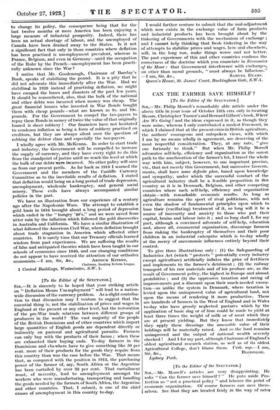CAN THE FARMER SAVE HIMSELF ?
[To the Editor of the SPECTATOR.] SIR,—Mr. Philip Morrell's remarkably able article under the above title in your issue of October 13th errs only in treating Messrs. Christopher Tumor's and Bernard Gilbert's book, Where Are We Going ? and the ideas expressed in it, as though they were mine, whereas I only contributed a modest Foreword, in which I claimed that at the present crisis in British agriculture, the authors' courageous and outspoken views, with which I am by no means wholly in agreement, are deserving of the most respectful consideration. They, at any rate, " give one furiously to think." But when Mr. Philip Morrell advocates self-help, efficiency and organization as the surest path to the amelioration of the farmer's lot, I travel the whole way with him, subject, however, to one important proviso, viz., that not merely this Government, but successive Govern- ments, shall have some definite plan, based upon knowledge and sympathy, under which the successful conduct of the agricultural industry shall be a feasible proposition in this country as it is in Denmark, Belgium, and other competing countries where such self-help, efficiency and organization
obtain—with remarkable economic results. As long as agriculture remains the sport of rival politicians, with not even the shadow of fundamental principles upon which to base their (vacillating) treatment of it, so long will it be a source of insecurity and anxiety to those who put their capital, brains and labour into it ; and so long shall for my part, although a convinced advocate of self-help, education and, above all, commercial organization, discourage farmers from risking the bankruptcy of themselves and their poor children in an industrial enterprise which is to-day wholly at the mercy of uneconomic influences entirely beyond their control.
To give three illustrations only : (1) the Safeguarding of Industries Act (which " protects " potentially every industry except agriculture) artificially inflates the price of fertilisers and implements to the farmer's detriment ; (2) the railway transport of his raw materials and of his produce are, as the result of Government policy, the highest in Europe and almost prohibitive ; and (3) the oppressive taxation and rating of improvements put a discount upon their much-needed execu- tion—so unlike the system in Denmark, where taxation is levied upon the unimproved value of agricultural land, not upon the means of rendering it more productive. There are hundreds of farmers in the West of England and in Wales to-day who have grossly neglected pastures which by the application of basic slag or of lime could be made to yield at least three times the weight of milk or of meat which they are at present yielding. But they know that immediately they apply these dressings the assessable value of their holdings will be materially raised. And so the land remains unimproved and the output of national wealth severely checked ! And I for my part, although Chairman of England's oldest agricultural research station, as well as of its oldest Agricultural College, don't blame them. Verb. sap.—I am, Lydney Park.














































 Previous page
Previous page